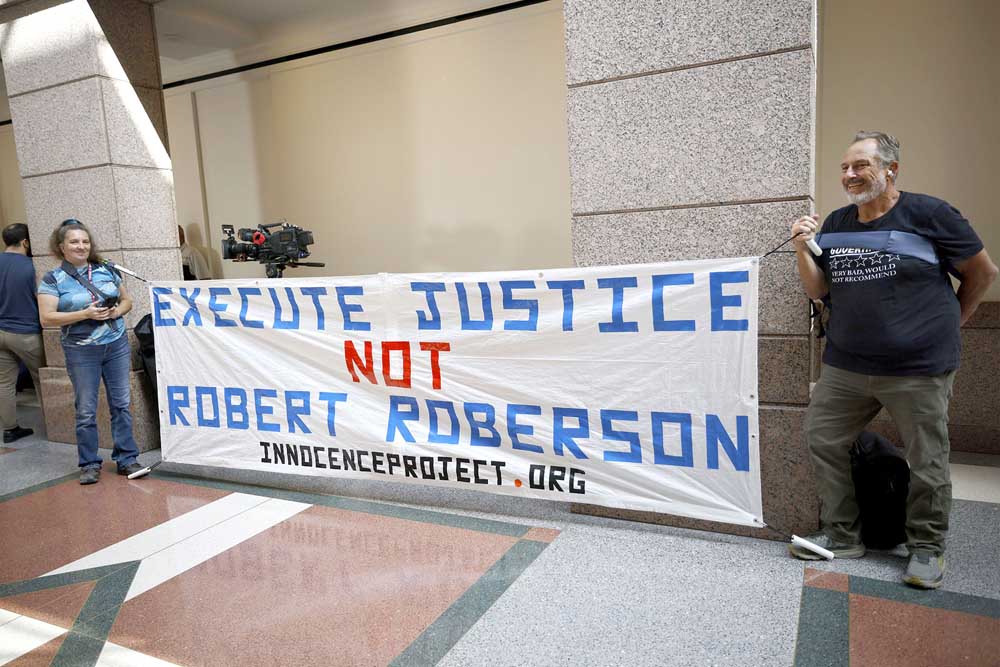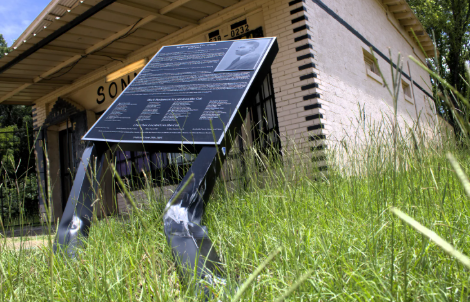Texas lawmakers can’t stop executions, state Supreme Court says
Published 1:13 pm Friday, November 15, 2024

- Amy Hedtke of Whitney and Bob Smilie of Duncanville hold a banner Oct. 21 in front of a hearing room at the Capitol in Austin where committee members were discussing the case of death row inmate Robert Roberson. (Chitose Suzuki/The Dallas Morning News/TNS)
DALLAS — The Texas Supreme Court ruled Friday the state Legislature does not have the power to stall an execution, ending a constitutional crisis that erupted after lawmakers subpoenaed Robert Roberson III to testify before a committee four days after he was scheduled to be put to death.
In an unprecedented exercise of legislative power, a bipartisan coalition of lawmakers subpoenaed Roberson — an East Texas man convicted in 2003 of killing his 2-year-old daughter — to testify before the House Committee on Criminal Jurisprudence about a state law that allows people convicted using disputed scientific theories to have their cases re-examined. That subpoena spurred a chaotic legal battle that ended in a stay late Oct. 17, the night Roberson was set to be put to death.
Trending
The novel legal maneuver triggered a separation of powers issue for the state’s highest civil court: Does the legislative branch’s investigatory power trump the executive branch’s obligation to carry out a death warrant issued by the judiciary?
“We have concluded that the committee could not overcome the other branches’ authority,” Justice Evan Young wrote in the 31-page opinion. “Legislative investigatory power, even at its maximum, is insufficient to forestall a long-scheduled execution under the circumstances presented here.”
Young said the dispute before the high court “has nothing to do with Roberson’s guilt or innocence or with the propriety of his sentence.”
State Reps. Joe Moody, D-El Paso, and Jeff Leach, R-Allen — lawyers who had asked the Supreme Court to determine if the subpoena must be obeyed even if it delayed an execution — said the committee will proceed with plans to interview Roberson.
“In holding that a legislative subpoena cannot delay an execution — never our specific intention — the Supreme Court also rightfully agreed that our legislative subpoena and this suit were valid,” the lawmakers said in a written statement. “Further, the Supreme Court strongly reinforced our belief that our Committee can indeed obtain Mr. Roberson’s testimony and made clear that it expects the Executive Branch of government to accommodate us in doing so.”
State Rep. Brian Harrison, a Midlothian Republican and member of the committee, said the ruling should clear the way for the committee to hear from the death row inmate.
Trending
“My expectation is that we will now receive Roberson’s testimony, and it will be clear in time who was on the right side of history and who championed the execution of a potentially innocent person,” Harrison said.
Roberson’s appellate attorney was not immediately available for comment, according to a spokeswoman.
Roberson was initially set to die by lethal injection in Huntsville in 2016, but his execution was delayed while the courts explored the “junk science” law. Further appeals failed, leading to Roberson’s execution scheduled for Oct. 17. The state parole board did not recommend clemency to Roberson, and the U.S. Supreme Court declined to weigh in.
Roberson’s attorneys and lawmakers, including half of the Republican-controlled House, argue his case was based on shaken baby syndrome, a medical determination that abuse has caused serious or fatal head trauma.
The criminal jurisprudence committee convened on the eve of his execution to discuss Roberson’s case. At the end of the daylong hearing, the committee unanimously voted to call Roberson to testify in-person. This was likely the first time a subpoena has been used to thwart the execution of a condemned person with hours to live.
In a legislative hearing Oct. 21, lawmakers wanted to bring the death row inmate to the Capitol to testify — a plan that drew national attention but did not pan out after Attorney General Ken Paxton raised concerns.
What is next for Roberson is unclear. Roberson has nearly exhausted his pleas to the Court of Criminal Appeals, and the panel of justices has already denied him relief under the junk science law. The state’s parole board has the power to reevaluate whether to recommend clemency, which would give way for Gov. Greg Abbott to commute Roberson’s sentence.
Another execution date can be scheduled no sooner than early 2025.






